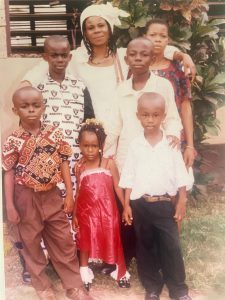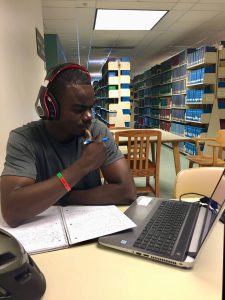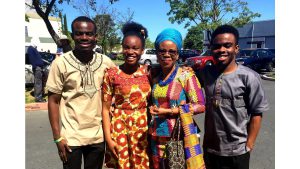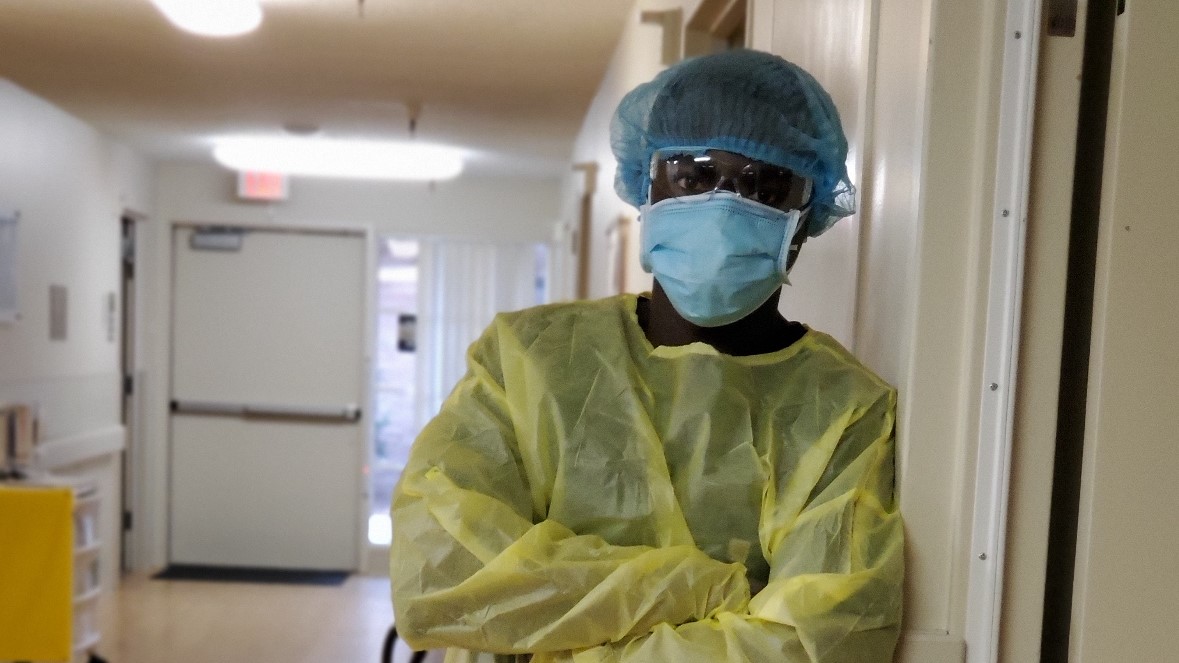Derrick Agbemenu’s journey has been one of many firsts. He is the first-born child of Divine and Bertha, natives of Ghana, the second-most populated country in West Africa. When he immigrated to America at 17, his father already stateside, he was the first of his two siblings to do so. It was also his first flight and the first time in another country. These first steps into a new life, amid unchartered territory, set Agbemenu on a course to achieve other firsts as well: the first in his family to attend college and the first to be accepted into medical school.
Agbemenu is also part of the first cohort of scholarship winners who started in the Charles R. Drew University of Medicine and Science MD Program as part of the Class of 2028 this summer. The full-tuition scholarship, academic support and experiential learning opportunities are courtesy of Sutter Health, a not-for-profit, integrated health system based in California.

Derrick Agbemenu, second from the left, with family in Ghana
It is somewhat ironic that Agbemenu was drawn to medicine in the first place. He said those in his community avoided seeking healthcare due to poor quality outcomes. It was also commonly thought that if you went to a hospital, the chances were high you wouldn’t return. His grandmother was one of those people who did not feel comfortable seeking care, despite having glaucoma. It wasn’t until U.S.-based doctors visited his community to establish pop-up clinics that his perception changed. He saw their efforts to build trust. In addition to new treatments and techniques, he saw them show empathy toward his grandmother and express compassion for her.
“When the physicians came to help her, that was when the seed was planted” for him to pursue medicine, he said.
It still took time for that concept to take shape for Agbemenu. The idea of becoming a physician seemed like a far-away concept as he assumed head-of-household responsibilities while his father immigrated to the U.S. long before the rest of the family. Under the loving guidance of his mother, he took on the added responsibility of serving as a father figure to his younger brother, Dennis, and sister, Berlla, who are five and eight years his junior, respectively. He even worked alongside his mother making and selling clothes to help make ends meet for the family.
“Things were tough. Playing that leadership role and being a child myself helped me develop into who I am today.” He said he realizes now those experiences were lessons on how to “balance life itself.”

Derrick Agbemenu studying at the library.
Upon arriving in the U.S., Agbemenu focused on his education. After attending Solano Community College, he transferred to the University of California, Davis, where he graduated with a bachelor’s degree in molecular and cellular biology. Agbemenu said his choice to pursue medicine was affirmed while attending UCD.
He volunteered as an outreach coordinator at a student-run clinic supporting the community of Oak Park in Sacramento. He called it a “very rewarding experience” that “changed the lives of those who lived there.” At the clinic, he said he and his fellow coordinators addressed factors that impeded the health of those in those neighborhoods. “It drives me to this day currently,” he said.
That drive ultimately landed Agbemenu to consider Charles R. Drew University of Medicine and Science. He credits the school’s supportive and inclusive environment as a major factor in his choice. He points to how advocacy is woven throughout the school’s curriculum and hands-on learning opportunities. And when he joined a group chat with current and incoming students, he realized he was part of something bigger. He was part a community with similar experiences — first-generation immigrants or medical students or people re-careering into medicine who want to change their communities for the better. He felt assured and welcome.
“When I looked at Charles Drew’s mission statement, it really resonated with me. It’s not just training leaders but raising leaders and advocates who can make an impact,” he said. “Charles Drew is more of a holistic experience, not just traditional medicine.”

Derrick with his sister, Berlla, his mother, Bertha, and his brother, Dennis.
Perhaps inspired from the stitching and sewing he did with his mother growing up, Agbemenu wants to become a surgeon, specifically an orthopedic surgeon. As a child who loved to play soccer, he sometimes saw serious injuries during play. And given that his community didn’t have many options for healthcare, they often relied on bamboo reeds to create splints or casts. They also depended upon medicinal herbs to help heal the injuries.
He feels with a greater knowledge base he can offer the care that his childhood friends didn’t have access to all those years ago — and potentially transform the hearts and minds of others just like those physicians did for Agbemenu when he was a child.
“When I look forward 10 to 15 years from now, I would love to go to Ghana just to set a up a clinic to address the health care they need,” he said.





